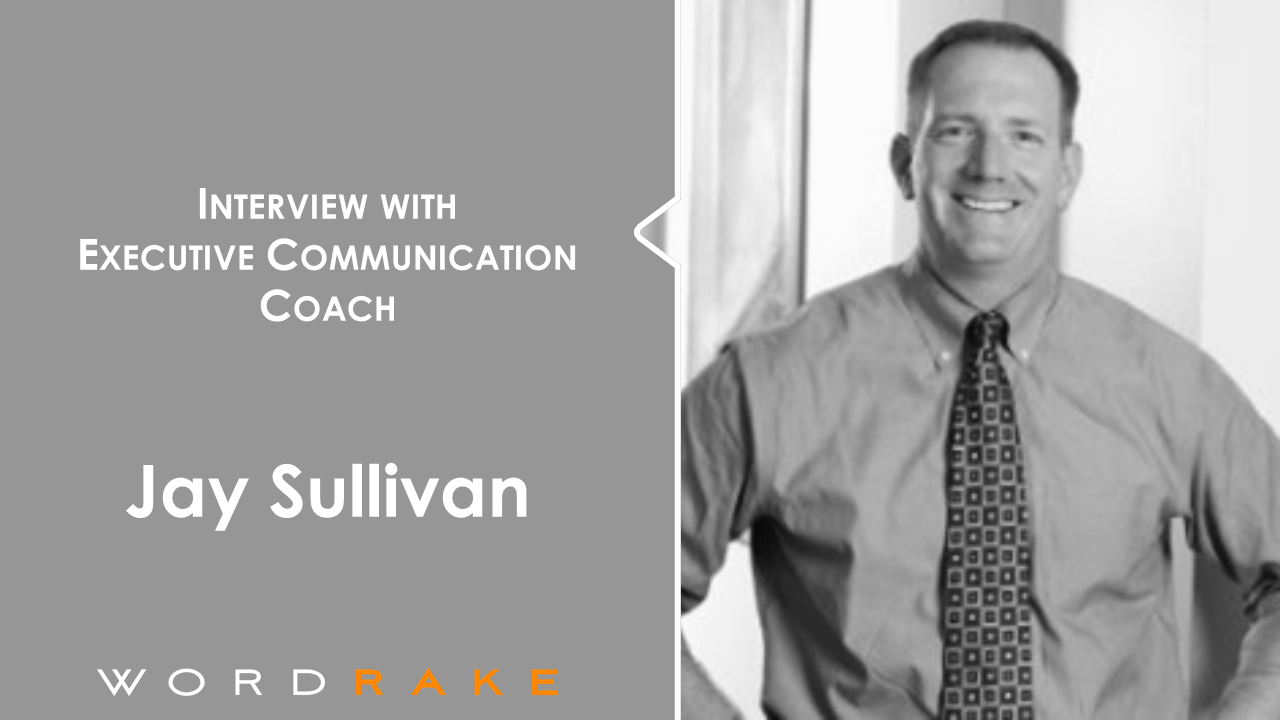A strong writer doesn’t just deliver information, she convinces you of its veracity and value. A strong communicator doesn’t just talk, she listens to uncover and understand her audience’s needs. The most successful professionals and executives do both. Together, these skills make you a trusted leader. And whether you are trusted to lead is the difference between a rainmaker and a service partner. If you dream of becoming a power player, this interview is for you.
In this enlightening interview, Jay Sullivan explains how he coaches promising young professionals to greatness and how they can position themselves for success. Jay also reveals how communication skills can make or break a career—regardless of whether you are the smartest person in the room.
We know that strong writing skills are key to a successful career, but do we know why? We spoke with executive communication coach Jay Sullivan to find out. Read on in this illuminating interview.
You practiced law for several years before transitioning into executive communication and coaching—what prompted that shift?
I was working very long hours and my kids were 4, 3, 2, and newborn. I wanted more control over my schedule. While I travel more with my current role (at least I did pre-COVID), when I am in New York, I am home for dinner, without fail.
How did your legal training prepare you for the role you have now?
My legal training prepared me to ask better questions, not take surface answers, think critically, and analyze issues quickly. All of those skills come into play when running a communication skills class or a coaching session. You have to listen carefully to what someone is sharing—which is often on a topic you are not very familiar with—and then determine their main message. You have to ask the person about their audience, understand both their objectives regarding the topic and the audience’s expectations, and help recraft their content so that it’s easy to understand.
How does the ability to communicate effectively impact professional development?
Our ability to develop and progress in our careers is driven only in part by the level of our intellect. It’s mostly driven by our ability to have impact. Being the smartest person in the room isn’t helpful if you can’t get people behind your ideas. Getting others to buy into your suggestions is driven by your communication skills. If you want to get ahead, you’ll need to convince others to follow you, and that requires top-notch communication skills.
What bad habits or missteps should mentors watch for in young professionals where intervention and executive coaching could save their career?
My firm doesn’t do interventions, as we normally think of that term. Rather, we’re usually asked to take someone who is already a very strong performer and help them get to the next level. Most of the time, we accomplish this by helping people realize that they will be more effective if they focus less on what they are trying to say and more on what the audience came to hear, what the audience needs to do with the information they share. This isn’t the same as telling people what they want to hear; it means making sure everything you are sharing is relevant to the audience.
How is writing linked to a successful legal career?
It’s everything. Most of our communication with colleagues and clients is done through our writing. How easy are you making it for your reader to understand your key message? How diligent are you about challenging your jargon? In your writing, remember: The client doesn’t care about the law, per se. They care about whether they can do the deal, win the case, minimize their risk in their settlement. Talk (write) about the law not from the perspective of the statute or case holding. Talk about the law from the perspective of how it impacts me, the client.
What can we learn about writing from listening?
There’s an old adage for creative writers: Great writers are great readers. This suggests that we get better at skills like writing specifically and communicating, more broadly, if we surround ourselves in good environments. Listening well makes us better writers from two angles. First, we can learn if our email was clear based on the questions that come back to us. Second, we can write better messages to begin with if we truly, deeply, listened to what the client said—their focus, their interests, their needs.
What’s a surprising way that clear communication and unclear communication can affect professional development?
Communication designed to show how smart we are rarely achieves that goal. It usually makes us sound self-important or ostentatious. Communication that is clear and directed to the reader’s needs makes us look smart. The easier you make it for someone else to understand your perspective and content, the more likely you will be to get the next, new, bigger opportunity.
What skill should up-and-coming professionals work on that will have the most impact on their success?
Listening skills. Hands down, the most important skills. After that, know your clear message for every meeting you attend. Always ask yourself, “when this meeting is over, if this audience remembers only one sentence, what is that sentence?” That’s your message.
If a young executive wants to position herself for advancement, what communication skills should she build first?
Listening skills.
How can young professionals use internal meetings and assignments to advance their careers?
Ask better questions up front so that when you go to find the answers, you have enough information. Don’t be afraid to ask further questions when you don't understand something. Minimize the use of “qualifying language” such as “kind of,” “sort of,” “basically,” and “essentially” because they add ambiguity and make you sound less definitive. Think in terms of being deliberate. Be deliberate in your word choice, your tone, and how you structure your messages. What people see you do in internal meetings is what they assume you are doing in external meetings.
How should young professionals shift their approach depending on whether their assignment is internal or external facing?
For internal conversations, you can ask more questions. Everyone at your firm or place of business knows your level of experience. They know you might just be learning the ropes on some issues. It’s OK to express uncertainty about your own abilities in that internal plane. It’s unnecessary and probably unhelpful to do the same in client-facing settings.
How can poor writing lead to problems in managing or completing a project?
Poor writing is, by definition, less clear. If I don’t understand the directions you have given me, I can’t do the job well and you will end up getting an inferior work-product. You’ll find yourself explaining the project to me again, but this time we’re already behind on the deadline.
What’s one piece of advice about communication you wish you’d been given as a young lawyer?
Deliver from an efficient and succinct set of notes. Don’t try to deliver from a complex, dense document with tons of content. Reduce what you want to say to a simple set of bullet points. Trust your brain to provide the details. This will help you stay more engaging.
Download an excerpt of Jay's book Simply Said: Communicating Better at Work and Beyond here.
About Jay Sullivan
Jay Sullivan is the Managing Partner at Exec-Comm, and leads the firm’s Law Firm Group. He is an award-winning author and columnist, as well as an Adjunct Professor at Georgetown Law Center. Jay works closely with the learning and development professionals at many global law firms and financial services firms to customize communication skills solutions. You can learn more about his training for groups here.
Jay joined Exec-Comm after nine years as a practicing attorney. He received his J.D. from Fordham University School of Law in 1989. That year, Jay was named among the first class of Skadden Fellows by the Skadden Foundation. As a Skadden Fellow, Jay acted as in-house legal counsel at Covenant House, a crisis shelter for runaway and homeless teenagers. Following his Fellowship, Jay spent seven years practicing insurance law on behalf of Lloyds of London.
Communicate Clearly with WordRake
WordRake is editing software for sophisticated writers who must communicate clearly. It improves writing by simplifying and clarifying text, cutting jargon, and recommending plain English replacements. WordRake runs in Microsoft Word and Outlook, and its suggestions appear in the familiar track-changes style. You decide when to run WordRake and which edits to accept, so you get quality and speed without sacrificing control. Editing for clarity and brevity has never been easier. Try WordRake for free for 7 days.






